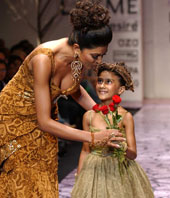 |
| Mother love: Single mom Sushmita Sen with her adopted daughter Renee |
It was an incident that took Neena Williams (name changed) by surprise. A mother of two adopted children, now aged 16 and 21, Neena — along with her husband — had recently stopped by the Canadian immigration office to apply for a visa for their son, who was leaving for Canada to pursue higher studies. The officials skimmed through the documents and enquired why the applicant was not accompanied to the office by his parents. The papers, after all, mentioned Neena and her husband as the boy’s “guardians”. “They wanted to know who his parents were and we were left fumbling for an answer,” recalls Neena.
Blame it on the law, if you will. The Hindu Adoption Act (HAA) of 1958 — till recently the chief legislation in the field of adoptions in India — did not wholly recognise adoptions by Christians, Muslims, Parsis and Jews in the country. So while those from other religions could legally identify themselves as parents of their foster children, practising Christians like Neena and her husband were only given guardianship of their adopted wards.
On the face of it, that may not seem like any cause for concern. But probe further and related problems begin to surface. “The most critical issue used to be that of inheritance,” says Lorraine Campos, adoption officer, Delhi Council of Child Welfare. “Being placed under the care of ‘guardians’, children adopted by minority families were not entitled to inherit property in the event of the death of their parents. Unless the parents registered a will guaranteeing their children their share of property, their children could well be left in the lurch,” she notes.
But a new law — the Juvenile Justice Act (JJA), initially notified in 2004 and amended in 2006, sought to put an end to this situation. JJA goes beyond immediate issues to address several other points that were previously not addressed by the HAA. Now implemented in its totality, it is being welcomed in some quarters as the perfect legislation for the adoption process.
To begin with, the JJA doesn’t look at adoptions on the basis of religion. “Adoption is now open to all, irrespective of religion,” says Delhi-based adoption lawyer Jagdeep Kishore. “The new law doesn’t distinguish between people of majority or minority communities and is applicable equally across the board,” he says.
Besides, the key issue of inheritance has also been taken care of, stresses Kishore. Parents don’t have to fret about issues such as bequeathing property any longer. “Once the adoption process is completed under the JJA, all inheritance laws begin to apply with immediate effect. Adopted children then automatically qualify as inheritors of their foster parents’ property,” he says.
In recent months, test cases of some people who were earlier given guardianship of their children under the HAA and are now keen on applying for parenthood, have been filed in several courts, adds Kishore. “The outcome of these cases will set the course for proceedings in the future,” he notes.
Further improvements brought about by the JJA include granting single people the right to adopt and the right to adopt more than one child of the same sex. The HAA previously limited the number of adoptions in a family to one child per gender.
“The Board may allow a child to be given in adoption to a single parent and [allow] parents to adopt a child of the same sex, irrespective of the number of living biological sons or daughters,” states Section 41 of the Act.
Not everyone, however, is happy with the development. Some consider this move to be nothing short of a legal blunder. The JJA, despite its implementation, does not supersede other Acts such as the HAA or the personal law boards of Islam, Christianity, Zoroastrianism and Judaism, which have governed adoption through decades. None of these, incidentally, ratify adoptions by members of the respective minority communities.
“It complicates matters further,” notes Supreme Court advocate Kailash Vasudev. “Anyone can now cite any law to either justify or challenge an adoption made by individuals of minority communities, and there is no overarching legislation that can help out under such circumstances.”
The implications, hints Vasudev, are rather serious. Take, for example, the case of a Christian or a Muslim couple who adopt a child under the JJA. On the day the child turns 18, his or her status as a legally adopted child can be challenged in court by a third party, citing either the HAA or personal law board dictums, all of which are concurrently applicable to the adoption. “What happens if the child is then denied his or her share of parental property, in the absence of a valid will,” asks Vasudev.
The only way to resolve this dilemma, say experts, is to push for a uniform civil law that reigns supreme in the field of adoption. But that’s easier said than done. “Personal law boards aren’t that willing to accept that logic, and may harbour fears that the introduction of such a law may be an attempt to sneak in the uniform civil code through the back door,” says social activist Shabnam Hashmi, who herself plodded through the muddle when she adopted her daughter 10 years ago. “And these law boards aren’t going to co-operate in any way when it comes to settling the issue legally,” she says.
At the moment then, the fate of a child adopted by parents belonging to a minority community seems to be hanging in the balance.










